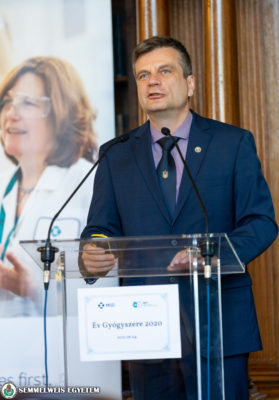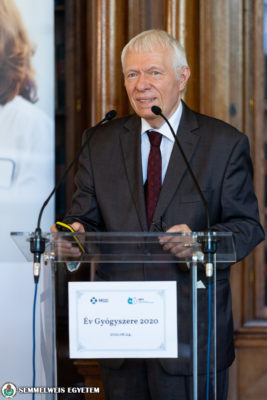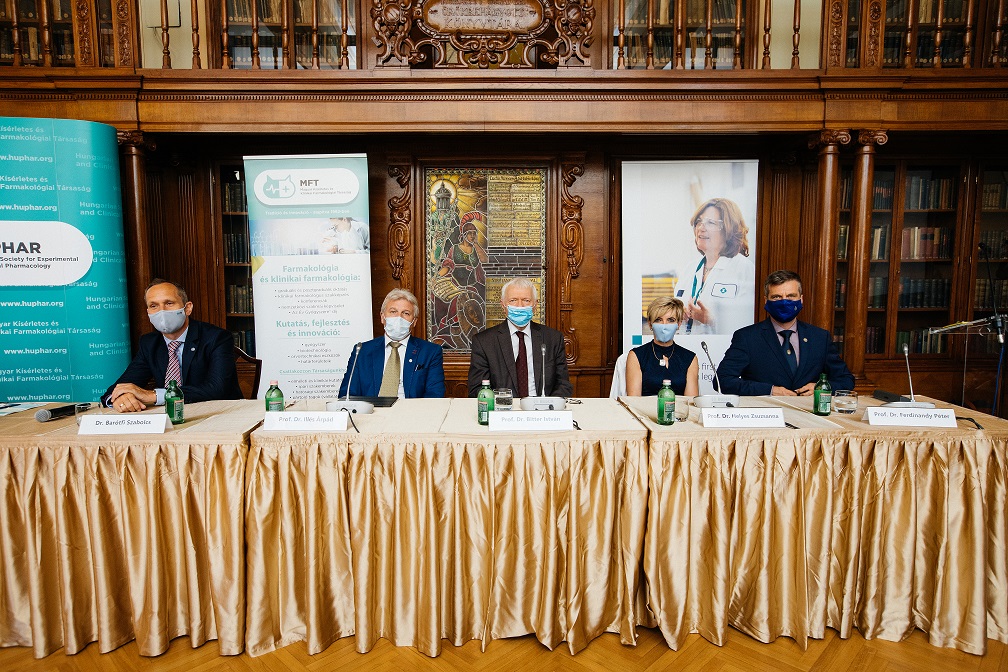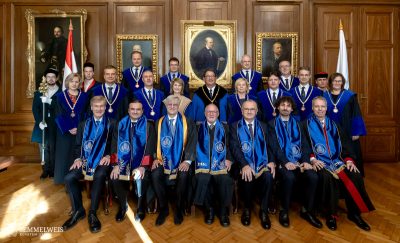 The official awards ceremony was opened by dr. Péter Ferdinandy (president of HUPHAR, vice-rector for Science and Innovations at Semmelweis University, head of Department of Pharmacology and Pharmacotherapy) who held a presentation about HUPHAR. The society was founded in 1962 to further develop pharmacology and clinical pharmacology and the innovation of medicinal products. It also aims to promote graduate and post-graduate pharmacology training programs and to present its latest results at Hungarian and international professional forums. The president emphasized that 21st century drug research and development is based on multidisciplinary area of translational research, development and innovation. Dr. Ferdinandy also talked about the society’s awards and conferences.
The official awards ceremony was opened by dr. Péter Ferdinandy (president of HUPHAR, vice-rector for Science and Innovations at Semmelweis University, head of Department of Pharmacology and Pharmacotherapy) who held a presentation about HUPHAR. The society was founded in 1962 to further develop pharmacology and clinical pharmacology and the innovation of medicinal products. It also aims to promote graduate and post-graduate pharmacology training programs and to present its latest results at Hungarian and international professional forums. The president emphasized that 21st century drug research and development is based on multidisciplinary area of translational research, development and innovation. Dr. Ferdinandy also talked about the society’s awards and conferences.
During evaluation, the selection board considers the following criteria: novelty of the mode of action, breakthrough potential of the chemical and/or biological scientific discovery, unmet needs in the relevant therapeutic area in Hungary, favourable adverse reaction and interaction profiles, cost efficiency, user friendliness and the added R&D value in Hungary.
 MSD won the Hungarian Society for Experimental and Clinical Pharmacology’s “Medicine of the Year” award for the fifth time. Over half of the adolescent population have been infected with CMV, (cytomegalovirus, belonging to the herpes-virus family) however they remain unsymptomatic. The pathogen in their body often remains latent, but it can reactivate at any time. In case of healthy individuals, this disease does not require any special treatment, however organ transplant recipients need therapy to recover, which – as a side effect – suppresses their immune system. Bone marrow transplant recipients also have a weakened immune system. In this group of patients the disease can cause fatal complications. The award winning medicine of MSD is a breakthrough, as previously there were only a limited number of medicine available to treat developing diseases, however preventive medicine had not been developed before– added dr. István Bitter (Chairman of the HUPHAR’s Evaluation Commitee, president of the Clinical Pharmacology Ethics Committee of the Medical Research Council, professor and professor emeritus of Semmelweis University Department of Psychiatry and Psychotherapy). He added that treatment does not have serious toxic side effects that have been associated with previous treatment procedures.
MSD won the Hungarian Society for Experimental and Clinical Pharmacology’s “Medicine of the Year” award for the fifth time. Over half of the adolescent population have been infected with CMV, (cytomegalovirus, belonging to the herpes-virus family) however they remain unsymptomatic. The pathogen in their body often remains latent, but it can reactivate at any time. In case of healthy individuals, this disease does not require any special treatment, however organ transplant recipients need therapy to recover, which – as a side effect – suppresses their immune system. Bone marrow transplant recipients also have a weakened immune system. In this group of patients the disease can cause fatal complications. The award winning medicine of MSD is a breakthrough, as previously there were only a limited number of medicine available to treat developing diseases, however preventive medicine had not been developed before– added dr. István Bitter (Chairman of the HUPHAR’s Evaluation Commitee, president of the Clinical Pharmacology Ethics Committee of the Medical Research Council, professor and professor emeritus of Semmelweis University Department of Psychiatry and Psychotherapy). He added that treatment does not have serious toxic side effects that have been associated with previous treatment procedures.
“It is a great honor for MSD to be the first company to receive this professional recognition for the fifth time after 1996, 2002, 2006 and 2017” – said dr. Szabolcs Barótfi, clinical research director at MSD.

The event also featured presentations by dr. Zsuzsanna Helyes (Secretary-General of HUPHAR, professor of the Department of Pharmacology and Pharmacotherapy at the University of Pécs), dr. Árpád Illés (professor of the Department of Hematology, Faculty of Medicine at the University of Debrecen) and Jasper Kunow (Managing Director Central Eastern Europe at MSD) who represented MSD Pharma Hungary Kft.
The Hungarian Society for Experimental and Clinical Pharmacology (HUPHAR) founded the “Medicine of the Year” award in 1997. The trademark-protected award was designed to use its professional prestige to advance the noble cause of promoting the spread of the most state-of-the-art, effective and patient-friendly products and helping new therapeutic procedures to become established in Hungary. Medicinal products of a pharmaceutical manufacturing and/or distribution companies with a marketing authorisation in the EU and/or Hungary can be submitted as entries.
Bernadett Bódi
Photo: Attila Kovács – Semmelweis University
Translation: Norbert Lukács


